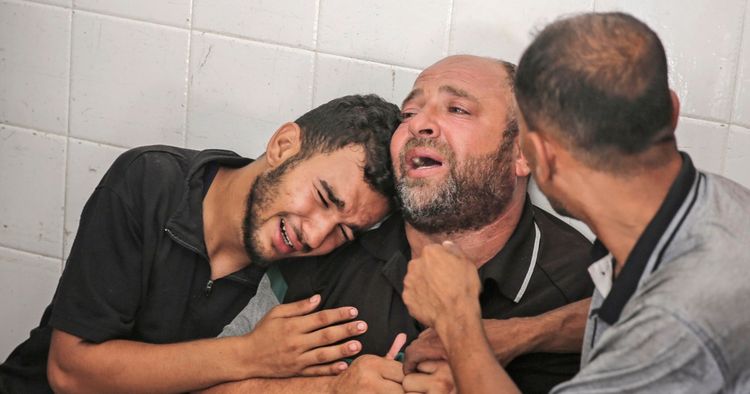Father's Day in Gaza brings heart wrenching lessons of grief and love

The other night, in recognition of the upcoming Father’s Day holiday, my eldest son, who is 15, took my hand in his own and he said to me: “Baba, I wanted to tell you that I won’t say ‘“Happy” Father’s Day,’ because I know this is a hard time. But I’m proud of you. I know you have been so sad and worn down because of the genocide of our people in Gaza. I feel it even when you are silent. I know you’re doing what you can to work for healing and justice, and I see you trying to protect us from the scars when you can. I know you cry and hide tears from us all the time. I love you.”
This Father’s Day, many fathers in Gaza are parenting upon the rubble of their own homes blown to pieces.
I looked at my son, and together we remained quiet. I felt the power of love behind his eyes and in the courage of his adolescent hands holding mine. Sometimes, we struggle to speak with such unspeakable sadness and rage stuck in our throats. This Father’s Day, many fathers in Gaza are parenting upon the rubble of their own homes blown to pieces. Sometimes, the debris has also become the communal grave of their murdered children’s buried bodies.
Yes, I cry often. And sometimes the tears run out. Still, I weep from within.
I cry when I see videos like one that circulated recently, showing a Palestinian father in Gaza holding up two plastic bags, a bag hanging from each of his two hands. The father is shouting to the camera, calling out to all people of the world — “These are my children!”
There are too many videos and images like this one. Palestinian fatherhood is fathering from a place of grief. This is not new for us, from a Palestinian perspective. But in some ways, fatherhood has changed as a result of the genocide in Gaza (which the U.S. and so many global powers actively support and make possible) and the scale of the loss and devastation.
Residing thousands of miles from Gaza, as a diaspora Palestinian from the U.S. and Chile, I find myself struggling to contend with this residue of loss and torment each moment of each day as I care for my own children while in mourning.
I know that parenthood will outlive the genocide, but many of our fathers have not. Many of our mothers have not. And too may of our children have lost their lives; those who are still alive have already lost their childhoods.
Colonizers consistently try to convince the world that the colonized are nobodies. They reduce people to racialized nothings who deserve loss, displacement and dispossession, because, as I wrote recently, “settler society not only needs land, but it needs to push an agonizing affect of loss across bodies and landscapes.”
So, on this Father’s Day, we grieve, and we resist the occupier’s lies and logic as we uplift our Palestinian fathers who keep affirming life, love and liberation in the most impossible conditions. We demand an immediate and permanent cease-fire and the end to the Israeli occupation. We demand that Palestinians are seen and treated as full human beings. And we commemorate all our Palestinian fathers murdered in the genocide, so many while protecting their loved ones — like the father who was burned alive holding his small child during a bombing of a group of tents sheltering families in Rafah last month. The hospital staff reported: “They were burned and charred. We couldn’t separate them. So we had to put both together in a body bag.”
As a professor of clinical psychology and a family therapist myself, I know from my research and practice that how we treat our children in a community depends on how we treat parents in society. How is the world treating Palestinian parents? What is this time of genocide revealing about the values of the current world order? In part, the genocide against Palestinians reveals how so many of the governing bodies of the world value Palestinian death and destruction — and are in fact deeply invested in it, with billions of dollars a year poured into making it possible.
Our Palestinian fathers in Gaza, on the other hand, teach the world how to value life, how to love our children — even when dead, burned, injured, disabled, shattered to pieces, starving to death, orphaned, incarcerated, tortured or chained. No matter what, our fathers keep fighting to protect and provide, despite being locked within a giant open-air concentration camp of fire and famine while cast upon the rubble of a history of pain. To all fathers in Gaza, you teach me that you can’t love if you can’t grieve. We grieve with you. We love you.
Dr. Devin G. Atallah
Dr. Devin G. Atallah is an assistant professor of psychology at the University of Massachusetts, Boston. A diaspora Palestinian from the U.S. and Chile, Dr. Atallah is a father, an educator, a researcher, and a psychotherapist. His ongoing work focuses on intergenerational trauma, grief, and healing in the face of settler-colonial violence and repression.




































































